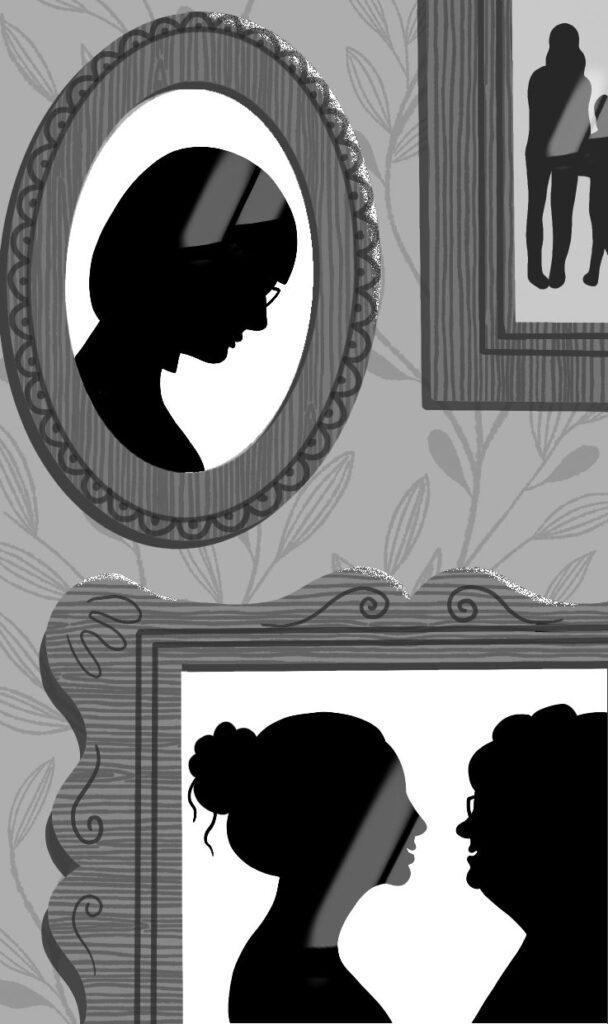The text arrived one afternoon in late December 2023. It contained no note, just a photograph of my mother holding the bouquet I had sent for her ninety-fifth birthday. She was smiling for the camera, but her look was vacant and her expression unnatural. My mother has vascular dementia and is declining. I was grateful for this glimpse of her face — to see her with flowers in hand.
The picture was taken by my younger sister. Her gesture was both thoughtful and kind. It helped assuage my guilt for being out of town on sabbatical leave, for not being there to celebrate in person.
My sister and I have been estranged for decades. Aside from the rare text, we seldom communicate. Still, she sent the image, knowing how much it would mean to me. And when I thanked her, she replied. My mother adored the flowers. She heard the message on the card.
My sister, I realized, had read aloud my words of love.
I can’t remember the last time I exchanged words with my sister in person. What I do recall is anger and betrayal, sadness and resignation. How did we come to an impasse? Why has it endured?

Portraits of familial estrangement.
Jamie Bennett
It wasn’t always this way. When we were young, we weren’t close, but we were connected. We both enjoyed the game I Spy, even though I was six years older. We’d gaze around, looking near and far, call out one guess, then another, and whoop with laughter at each discovery.
Every Halloween we went trick-or-treating, canvassing our Montreal neighbourhood in search of the best treats. I was charged with supervising her and took the assignment seriously. I’d watch for traffic and hold her hand as we crossed the street. We’d always come home with a good haul and compare our loot, spread out before us on the living room rug. As we surveyed our stash — Twizzlers, hard candy, chocolate, pretzels, and Cheetos — we stayed vigilant, lest our father swoop in and grab what he fancied.
On road trips, both long and short, we cocooned in the plush back seat of our parents’ big Buick. I’d cradle my sister in my lap and sing softly into her ear. “Leaving on a Jet Plane” and “Where Have All the Flowers Gone?” were two of her favourite ballads.
Then, when I turned eleven, I became her babysitter on evenings when my parents went out. Sitting side by side on the sofa, we’d watch Lassie. I’d switch off the television when it was time for bed, and she never complained. She never gave me a hassle.
In our suburban bungalow, I was given my own room, a privilege accorded me as the eldest child. My two sisters shared a bedroom. I envied their closeness, fostered by the physical proximity of matching twin beds, as well as their lesser age difference — they were four years apart — and common attributes. Both were slender, light-haired, and beautiful; I was their opposite.
And so I mistreated my little sister. The cramped corner under my desk became her designated spot on the floor in my small bedroom. Rather than object, she fit her body into the tiny space, happy to be included in sisterly play.
When she was three, I convinced her there was a toilet in my narrow closet. I told her that the toilet was there, even if it was invisible, and that she could go ahead and pee. When she did so, I was shocked. She had believed me! I learned then the power older sisters have over younger sisters and the need to wield it carefully.
As we got older, family strife took hold. I became more solitary and sought refuge in books. My sister chose to spend time with friends, at their homes and on neighbourhood streets. Then my parents decided to move. They decamped for Florida, abandoning the cold and grey skies of Montreal for the heat and sunshine of Fort Lauderdale. And life changed.
By this time, I was nineteen, living in Ottawa and attending second-year university. My middle sister had completed high school and elected to remain in Quebec, where she stayed with our maternal grandparents. Only my little sister, who was just starting grade 8, relocated with our parents. Suddenly it was as if she were an only child.
She lived in Fort Lauderdale alone with our parents for five years. Periodically we would all come together as a clan in Montreal, but those visits could not offset so much time apart.
Gradually the new family relationships solidified. How could it be otherwise? My sister and my parents became a triad. When I visited during winter break and on summer holidays, it was clear they shared a loyalty and mutual understanding that excluded me. With our mother, she chatted freely and disclosed her secrets. When there was friction, she could defuse our father’s fury and ease our mother’s distress. She had become the steadying force at the centre of their lives. She may not have chosen the role of conciliator, but she had come to accept the part nonetheless.
When it was time to enter university, my sister returned to Canada. She might have chosen to study in Montreal. There she would have been close to our middle sister. Instead, she made her way to Toronto, where I had been living for some time. I had arrived to attend graduate school, then opted to settle there and teach. I had made friends; I was engaged to be married.
She was eighteen; I was twenty-four. We had not lived together in the same house for a long time and were at different stages in life. But I wanted to get to know her, to connect with her as an adult. I also hoped to ease her transition to university. I had navigated this shift away from home myself and knew its challenges.
I bought rotisserie chicken, and, over dinner at my apartment, we pretended to fight over the two wings, the way we three sisters used to do as kids. I threw her a party when she turned twenty. I celebrated with her new friends and served them tea sandwiches and vanilla layer cake with chocolate icing — her favourite, the very cake our mother would bake for her each year. I lent her my car when I went out of town. Once, she got into a terrible accident. Thankfully, she was unscathed, but she left me to deal with the insurance company and vehicle repair when I returned from vacation. It was not a happy homecoming, but I had to forgive her. I was older, and it was expected of me — by my sister and my parents both.
My sister liked to surprise me in small ways. When we were children, she would make me tuna fish sandwiches for lunch. Now, with little money to spare, she supplied me with toilet paper pilfered from her shared dorm room.
Although her courses were demanding, she applied herself. She attended classes and took part in campus events. She didn’t say so, but I’m sure she felt unmoored — no longer tethered to our parents and the familiar routine of home life.
We spent time together, but we were not yet companions. At times, over perceived slights — the details of which I can no longer exhume — she would get angry and not call me for days. I found her silence confusing. When I reached out to make peace, she always relented. Neither the reasons for her pique nor the effects of each deadlock were discussed, however. So the pattern persisted.
She phoned one night when she was in third year. It was 2 a.m., and I was jolted awake by the loud ring of the telephone. Her ear was burning, and she wanted me to take her to the hospital. I sensed it was probably an earache and tried to reason with her. I urged her to take some Tylenol, go back to bed, and call the doctor when she woke up. “It’s the dead of night,” I added. But she was insistent. “If you won’t take me, I’ll call my friend Rena. She’ll drive me there immediately.” Then she hung up.
Rena did take her; it was an earache.
I wanted to talk it out, but my sister refused. And she never got over it. Rather, the moment the phone went dead — that split second of disconnection — marked the end of our relationship. I called and pleaded. “We’re sisters,” I said. She was unbending and withdrew, distancing herself from me. It was the final breach.
I pondered her extreme reaction and grieved the loss of my sister.
Not long afterwards, my parents visited Toronto, and over Sunday brunch I mused, “How could she go so far as to cut me out of her life?” My mother had a ready answer. “Well,” she said, “if you’d taken her to the hospital, none of this would have happened. You are responsible. It’s all up to you now.” My father looked straight at me and nodded in agreement. My sister’s response made sense to them.
I was startled. None of it made sense to me: my sister’s swift rejection; my mother’s endorsement of her action; and my parents’ reluctance to acknowledge my pain.
My sister and I have never reconciled, though we went on to live parallel lives. For twenty-five years, we resided in the same suburb north of Toronto, where we each raised a son and a daughter and where, somehow, our paths never crossed. We still live in the same city.
Our parents never tried to bring us together. Unlike my middle sister, who has made efforts to stay neutral, they chose sides and formed a warm relationship with my sister’s husband and children. That choice hurt me, of course. To this day, I can’t help but wonder about their private and reciprocal need for one another, my understanding still unfinished.
While my aged mother and I remain connected, it is with my youngest sister that she maintains a deep and abiding bond. Theirs is a unique tie. They are a devoted dyad, my father having died twenty-six years ago.
I often wonder if what my sister really wanted — when she called me that night so long ago — was less medical than motherly attention. If so, I sadly missed that cue. I could not have known then how much mothering I, too, would come to crave.
Ruth Panofsky teaches English literature at Toronto Metropolitan University. She recently received the Royal Society of Canada’s Lorne Pierce Medal.

